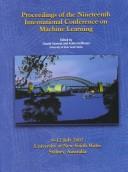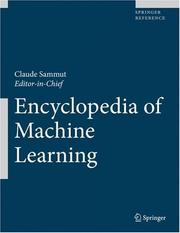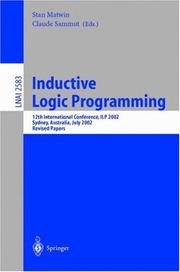| Listing 1 - 10 of 13 | << page >> |
Sort by
|

ISBN: 1558608737 Year: 2002 Publisher: San Francisco Morgan Kaufmann
Abstract | Keywords | Export | Availability | Bookmark
 Loading...
Loading...Choose an application
- Reference Manager
- EndNote
- RefWorks (Direct export to RefWorks)
Book
ISBN: 1489976876 148997685X Year: 2017 Publisher: New York : Springer,
Abstract | Keywords | Export | Availability | Bookmark
 Loading...
Loading...Choose an application
- Reference Manager
- EndNote
- RefWorks (Direct export to RefWorks)
This authoritative, expanded and updated second edition of Encyclopedia of Machine Learning and Data Mining provides easy access to core information for those seeking entry into any aspect within the broad field of Machine Learning and Data Mining. A paramount work, its 800 entries - about 150 of them newly updated or added - are filled with valuable literature references, providing the reader with a portal to more detailed information on any given topic. Topics for the Encyclopedia of Machine Learning and Data Mining include Learning and Logic, Data Mining, Applications, Text Mining, Statistical Learning, Reinforcement Learning, Pattern Mining, Graph Mining, Relational Mining, Evolutionary Computation, Information Theory, Behavior Cloning, and many others. Topics were selected by a distinguished international advisory board. Each peer-reviewed, highly-structured entry includes a definition, key words, an illustration, applications, a bibliography, and links to related literature. The entries are expository and tutorial, making this reference a practical resource for students, academics, or professionals who employ machine learning and data mining methods in their projects. Machine learning and data mining techniques have countless applications, including data science applications, and this reference is essential for anyone seeking quick access to vital information on the topic.
Computer science. --- Data mining. --- Artificial intelligence. --- Pattern recognition. --- Statistics. --- Computer Science. --- Artificial Intelligence (incl. Robotics). --- Data Mining and Knowledge Discovery. --- Statistics and Computing/Statistics Programs. --- Pattern Recognition. --- Statistical analysis --- Statistical data --- Statistical methods --- Statistical science --- Design perception --- Pattern recognition --- AI (Artificial intelligence) --- Artificial thinking --- Electronic brains --- Intellectronics --- Intelligence, Artificial --- Intelligent machines --- Machine intelligence --- Thinking, Artificial --- Algorithmic knowledge discovery --- Factual data analysis --- KDD (Information retrieval) --- Knowledge discovery in data --- Knowledge discovery in databases --- Mining, Data --- Informatics --- Mathematical statistics. --- Optical pattern recognition. --- Artificial Intelligence. --- Optical data processing --- Pattern perception --- Perceptrons --- Visual discrimination --- Mathematics --- Statistical inference --- Statistics, Mathematical --- Statistics --- Probabilities --- Sampling (Statistics) --- Database searching --- Bionics --- Cognitive science --- Digital computer simulation --- Electronic data processing --- Logic machines --- Machine theory --- Self-organizing systems --- Simulation methods --- Fifth generation computers --- Neural computers --- Machine learning --- Data mining --- Learning, Machine --- Artificial intelligence
Digital
ISBN: 9781489976871 Year: 2017 Publisher: Boston, MA Springer US
Abstract | Keywords | Export | Availability | Bookmark
 Loading...
Loading...Choose an application
- Reference Manager
- EndNote
- RefWorks (Direct export to RefWorks)
This authoritative, expanded and updated second edition of Encyclopedia of Machine Learning and Data Mining provides easy access to core information for those seeking entry into any aspect within the broad field of Machine Learning and Data Mining. A paramount work, its 800 entries - about 150 of them newly updated or added - are filled with valuable literature references, providing the reader with a portal to more detailed information on any given topic. Topics for the Encyclopedia of Machine Learning and Data Mining include Learning and Logic, Data Mining, Applications, Text Mining, Statistical Learning, Reinforcement Learning, Pattern Mining, Graph Mining, Relational Mining, Evolutionary Computation, Information Theory, Behavior Cloning, and many others. Topics were selected by a distinguished international advisory board. Each peer-reviewed, highly-structured entry includes a definition, key words, an illustration, applications, a bibliography, and links to related literature. The entries are expository and tutorial, making this reference a practical resource for students, academics, or professionals who employ machine learning and data mining methods in their projects. Machine learning and data mining techniques have countless applications, including data science applications, and this reference is essential for anyone seeking quick access to vital information on the topic.
Mathematical statistics --- Information systems --- Artificial intelligence. Robotics. Simulation. Graphics --- Computer. Automation --- patroonherkenning --- factoranalyse --- datamining --- machine learning --- data mining --- informatica --- statistiek --- klonen --- KI (kunstmatige intelligentie) --- data acquisition --- optica --- AI (artificiële intelligentie)

ISBN: 9780387301648 9780387307688 Year: 2010 Publisher: New York, NY Springer US
Abstract | Keywords | Export | Availability | Bookmark
 Loading...
Loading...Choose an application
- Reference Manager
- EndNote
- RefWorks (Direct export to RefWorks)
Statistical science --- Mathematical statistics --- Information systems --- Artificial intelligence. Robotics. Simulation. Graphics --- patroonherkenning --- factoranalyse --- datamining --- statistiek --- KI (kunstmatige intelligentie) --- data acquisition --- statistisch onderzoek --- AI (artificiële intelligentie)
Book
Year: 2017 Publisher: New York, NY : Springer US : Imprint: Springer,
Abstract | Keywords | Export | Availability | Bookmark
 Loading...
Loading...Choose an application
- Reference Manager
- EndNote
- RefWorks (Direct export to RefWorks)
This authoritative, expanded and updated second edition of Encyclopedia of Machine Learning and Data Mining provides easy access to core information for those seeking entry into any aspect within the broad field of Machine Learning and Data Mining. A paramount work, its 800 entries - about 150 of them newly updated or added - are filled with valuable literature references, providing the reader with a portal to more detailed information on any given topic. Topics for the Encyclopedia of Machine Learning and Data Mining include Learning and Logic, Data Mining, Applications, Text Mining, Statistical Learning, Reinforcement Learning, Pattern Mining, Graph Mining, Relational Mining, Evolutionary Computation, Information Theory, Behavior Cloning, and many others. Topics were selected by a distinguished international advisory board. Each peer-reviewed, highly-structured entry includes a definition, key words, an illustration, applications, a bibliography, and links to related literature. The entries are expository and tutorial, making this reference a practical resource for students, academics, or professionals who employ machine learning and data mining methods in their projects. Machine learning and data mining techniques have countless applications, including data science applications, and this reference is essential for anyone seeking quick access to vital information on the topic.
Book
ISBN: 1280385057 9786613562975 038730164X Year: 2010 Publisher: New York, NY : Springer US : Imprint: Springer,
Abstract | Keywords | Export | Availability | Bookmark
 Loading...
Loading...Choose an application
- Reference Manager
- EndNote
- RefWorks (Direct export to RefWorks)
Artificial intelligence. --- Data mining. --- Pattern recognition. --- Statistics . --- Artificial Intelligence. --- Data Mining and Knowledge Discovery. --- Pattern Recognition. --- Statistics for Engineering, Physics, Computer Science, Chemistry and Earth Sciences. --- Pattern perception. --- Statistics.

ISBN: 3540005676 3540364684 Year: 2003 Publisher: Berlin, Heidelberg : Springer Berlin Heidelberg : Imprint: Springer,
Abstract | Keywords | Export | Availability | Bookmark
 Loading...
Loading...Choose an application
- Reference Manager
- EndNote
- RefWorks (Direct export to RefWorks)
The Twelfth International Conference on Inductive Logic Programming was held in Sydney, Australia, July 9–11, 2002. The conference was colocated with two other events, the Nineteenth International Conference on Machine Learning (ICML2002) and the Fifteenth Annual Conference on Computational Learning Theory (COLT2002). Startedin1991,InductiveLogicProgrammingistheleadingannualforumfor researchers working in Inductive Logic Programming and Relational Learning. Continuing a series of international conferences devoted to Inductive Logic Programming and Relational Learning, ILP 2002 was the central event in 2002 for researchers interested in learning relational knowledge from examples. The Program Committee, following a resolution of the Community Me- ing in Strasbourg in September 2001, took upon itself the issue of the possible change of the name of the conference. Following an extended e-mail discussion, a number of proposed names were subjected to a vote. In the ?rst stage of the vote, two names were retained for the second vote. The two names were: Ind- tive Logic Programming, and Relational Learning. It had been decided that a 60% vote would be needed to change the name; the result of the vote was 57% in favor of the name Relational Learning. Consequently, the name Inductive Logic Programming was kept.
Logic programming --- Computer Science --- Engineering & Applied Sciences --- Computer science. --- Software engineering. --- Computer programming. --- Algorithms. --- Mathematical logic. --- Artificial intelligence. --- Computer Science. --- Software Engineering/Programming and Operating Systems. --- Artificial Intelligence (incl. Robotics). --- Computer Science, general. --- Programming Techniques. --- Algorithm Analysis and Problem Complexity. --- Mathematical Logic and Formal Languages. --- Computer software. --- Artificial Intelligence. --- Computer software engineering --- Engineering --- Software, Computer --- Computer systems --- Informatics --- Science --- AI (Artificial intelligence) --- Artificial thinking --- Electronic brains --- Intellectronics --- Intelligence, Artificial --- Intelligent machines --- Machine intelligence --- Thinking, Artificial --- Bionics --- Cognitive science --- Digital computer simulation --- Electronic data processing --- Logic machines --- Machine theory --- Self-organizing systems --- Simulation methods --- Fifth generation computers --- Neural computers --- Algebra of logic --- Logic, Universal --- Mathematical logic --- Symbolic and mathematical logic --- Symbolic logic --- Mathematics --- Algebra, Abstract --- Metamathematics --- Set theory --- Syllogism --- Algorism --- Algebra --- Arithmetic --- Computers --- Electronic computer programming --- Electronic digital computers --- Programming (Electronic computers) --- Coding theory --- Foundations --- Programming --- Logic, Symbolic and mathematical.
Digital
ISBN: 9781489975027 Year: 2020 Publisher: New York, NY Springer US
Abstract | Keywords | Export | Availability | Bookmark
 Loading...
Loading...Choose an application
- Reference Manager
- EndNote
- RefWorks (Direct export to RefWorks)
This authoritative, expanded and updated third edition of Encyclopedia of Machine Learning and Data Mining provides easy access to core information for those seeking entry into any aspect within the broad field of Machine Learning and Data Mining. A paramount work, its 1000 entries – over 200 of them newly updated or added --are filled with valuable literature references, providing the reader with a portal to more detailed information on any given topic.Topics for the Encyclopedia of Machine Learning and Data Science include recent developments in Deep Learning, Learning and Logic, Data Mining, Applications, Text Mining, Statistical Learning, Reinforcement Learning, Pattern Mining, Graph Mining, Relational Mining, Evolutionary Computation, Information Theory, Behavior Cloning, and many others. Topics were selected by a distinguished international advisory board. Each peer-reviewed, highly-structured entry includes a definition, key words, an illustration, applications, a bibliography, and links to related literature.The entries are expository and tutorial, making this reference a practical resource for students, academics, or professionals who employ machine learning and data mining methods in their projects. Machine learning and data mining techniques have countless applications, including data science applications, and this reference is essential for anyone seeking quick access to vital information on the topic.
Book
ISBN: 1489975020 Year: 2020 Publisher: New York, NY : Springer US : Imprint: Springer,
Abstract | Keywords | Export | Availability | Bookmark
 Loading...
Loading...Choose an application
- Reference Manager
- EndNote
- RefWorks (Direct export to RefWorks)
This authoritative, expanded and updated third edition of Encyclopedia of Machine Learning and Data Mining provides easy access to core information for those seeking entry into any aspect within the broad field of Machine Learning and Data Mining. A paramount work, its 1000 entries – over 200 of them newly updated or added --are filled with valuable literature references, providing the reader with a portal to more detailed information on any given topic.Topics for the Encyclopedia of Machine Learning and Data Science include recent developments in Deep Learning, Learning and Logic, Data Mining, Applications, Text Mining, Statistical Learning, Reinforcement Learning, Pattern Mining, Graph Mining, Relational Mining, Evolutionary Computation, Information Theory, Behavior Cloning, and many others. Topics were selected by a distinguished international advisory board. Each peer-reviewed, highly-structured entry includes a definition, key words, an illustration, applications, a bibliography, and links to related literature.The entries are expository and tutorial, making this reference a practical resource for students, academics, or professionals who employ machine learning and data mining methods in their projects. Machine learning and data mining techniques have countless applications, including data science applications, and this reference is essential for anyone seeking quick access to vital information on the topic.

ISBN: 9780387301648 9780387307688 Year: 2010 Publisher: Boston MA Springer US
Abstract | Keywords | Export | Availability | Bookmark
 Loading...
Loading...Choose an application
- Reference Manager
- EndNote
- RefWorks (Direct export to RefWorks)
| Listing 1 - 10 of 13 | << page >> |
Sort by
|

 Search
Search Feedback
Feedback About UniCat
About UniCat  Help
Help News
News